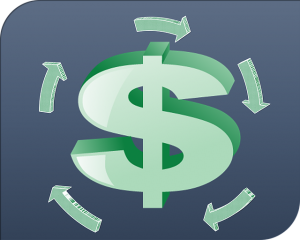6 tips to stay in Control of your Cash Flow with Confidence

Cash Flow is the major cause 56% of small businesses don’t survive past their 5th birthday. It is time to turn the tables on that horrific statistic and be in charge of your cash flow (with confidence) and remove the stigma and fear around asking for your invoices to be paid.
The first thing to consider is that cash flow is not just chasing debtors. Cash flow is understanding – when that money does come in, what are you doing with it? So cash flow is looking at cash in AND cash out.
If all you are looking at is your debtors, then you are only looking at half of the problem or half of the picture. So how can you fix the entire problem?
So here are six tips we give our clients in our Financial Coaching & Business Strategy sessions to help build confidence around Cash Flow:
1. How do you accept money from your customers? In this day and age, accepting payment up front or accepting a deposit or instalment amount is really quite normal. Do you go to a hair dresser and pay for the service 30 days later?? Or pay for a doctor 30 days after your illness is fixed?? Heck no. Payment up front or via instalments for large projects is normal. Get used to it, get used to talking about it, get used to asking for it, get used to invoicing that way. Upfront and deposit arrangements enables you to get money coming in to start working on the project and not be left high and dry. Remember – you set the terms.
2. A gentle reminder never hurt anyone. The number of times we find people say “Oh, I am too embarrassed to follow up the invoice because it has been 3 months.” You know what – you shouldn’t be in that situation in the first place, and you have put yourself in that position. So pull up your big girl pants and start asking (and also change your processes so it doesn’t happen again). We always suggest to send a reminder two days before the invoice is due. Most business owners suffer from inbox overwhelm, so your invoice could simply be missed.
It does not mean that they do not want to pay it, it just means it may have just completely slipped their mind, or become lost in their mammoth inbox.
So we find that rather than asking clients for money after the due date, sending a subtle reminder before the invoice becomes due saying “Hey, just a heads up. This invoice is due in 2 days time. Just making sure you are aware of it and it is in your system for payment” is a much nicer email to receive, and far more effective.
3. Understanding what happens when that money comes in. So it is all very well to say “Yes, I have my debtors under control”, but you could still have cash flow problems because you are spending every single cent that comes into your business.
To operate a financially sustainable business that is here for the long term, you need to build cash reserves so that your business can manage growth.
In order to have those cash reserves you need to understand where your money is going every single month. You don’t want to get to the end of the financial year and realise your income was $100,000 and your expenses were also $100,000. Or even worse, that you have actually spent more than what you have earned and you are in a negative cash flow position.
Trying to fix something, 3 or 6 months after it has happened, whilst it’s possible to fix the problem going forward, you have potentially had 3-6 months of issues with your cash that you haven’t been able to fix.
4. Those pesky non essential costs can mount up. So which areas are you spending money that is not directly helping your business to grow or earn additional income? It is about understanding where you should be spending. But in order to do that, you need to understand your clients, where they come from and what they are interested in. It will be different for everybody, we know that, but that is why the financial reports are so useful for you to analyse. Anything that is not contributing to your business growth should be questioned.
5. Profit does not mean cash. The sooner you realise your profit and bank balance are not the same thing, the better chances your business has of survival.
The Profit & Loss report is not the only report you should be looking at to work out cash flow and payment obligations to third parties. Shock horror run a Balance Sheet – you might get a surprise.
A lot of business owners only look at their Profit & Loss to ascertain how much cash they have, and it is really not the best report to show you your cash movement. Purely from the perspective that assets, GST obligations, and personal drawings are not included in that profit report. If you don’t know – ask, don’t be embarrassed to educate yourself about your financial obligations (your future self will thank you).
6. We love bank accounts – why? Because they help us save money and build up our cash reserves to fund our growth. We haven’t borrowed money in our business, and we have used those cash reserves we have tucked away to fund our staff growth, to buy new computers and to fund our interstate conferences for our development.
It is almost like a safety blanket, to have that money set aside – but also knowing that your business can operate without those extra funds. That is how you will fund growth in a sustainable and manageable way.
